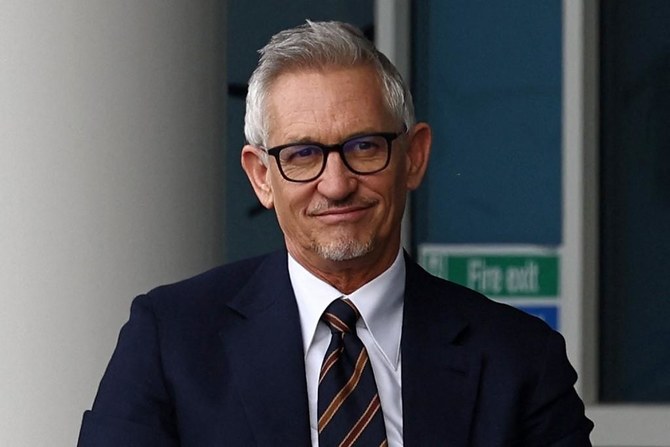LONDON: Gary Lineker will return to the airwaves after the BBC reversed the former soccer great’s suspension on Monday for a tweet that had criticized the UK government’s new migration policy.
The about-face followed a weekend of chaos and crisis for Britain’s publicly funded national broadcaster, which faced a huge backlash over the suspension of one of its best-known hosts for expressing a political opinion.
“Gary is a valued part of the BBC and I know how much the BBC means to Gary, and I look forward to him presenting our coverage this coming weekend,” BBC Director-General Tim Davie said.
Lineker said he was “glad that we have found a way forward.”
Lineker, one of English soccer’s most lauded players and the corporation’s highest-paid television presenter, was suspended Friday after he described the government’s plan to detain and deport migrants arriving by boat as “an immeasurably cruel policy directed at the most vulnerable people in language that is not dissimilar to that used by Germany in the 30s.”
The Conservative government called Lineker’s Nazi comparison offensive and unacceptable, and some lawmakers said the BBC should terminate his contract.
The broadcaster said the tweet breached its impartiality rules, but critics accused it of suppressing free speech. The BBC was forced to scrap much of its weekend sports programming after commentators, analysts and Premier League players refused to appear as a show of support of Lineker.
The flagship soccer show “Match of the Day” was reduced from the usual 90 minutes of highlights and analysis to a 20-minute compilation of clips from the day’s games, without commentary or punditry. Other TV and radio soccer shows were pulled from the schedule on Saturday and Sunday because of a lack of staff willing to present them.
Davie insisted Monday that the BBC “did the right thing” by suspending Lineker, but there would now be an independent review of the BBC’s social media rules to address the “gray areas” in the guidelines.
“Between now and when the review reports, Gary will abide by the editorial guidelines,” he said.
The 100-year-old BBC, which is funded by a license fee paid by all households with a television, has a duty to be impartial in its news coverage, and BBC news staff are barred from expressing political opinions.
Lineker, as a freelancer who doesn’t work in news or current affairs, isn’t bound by the same rules, and has sometimes pushed the boundaries of what the BBC considers acceptable. Last year, the BBC found that Lineker breached impartiality rules with a tweet about the Conservatives’ alleged Russian donations.
BBC neutrality has come under recent scrutiny over revelations that its chairman, Richard Sharp — a Conservative Party donor — helped arrange a loan for then Prime Minister Boris Johnson in 2021, weeks before Sharp was appointed to the BBC post on the government’s recommendation.
Lineker said it had been “a surreal few days” and thanked people for their support.
“A final thought: however difficult the last few days have been, it simply doesn’t compare to having to flee your home from persecution or war to seek refuge in a land far away,” he tweeted. “It’s heartwarming to have seen the empathy toward their plight from so many of you.”
BBC reverses Gary Lineker suspension for Twitter post
https://arab.news/nd74v
BBC reverses Gary Lineker suspension for Twitter post

- Presenter was suspended after he described UK government immigration plans “not dissimilar” to Nazi Germany
- BBC faced weekend of chaos after it was accused of suppressing free speech, broadcast to review its social media rules
Hezbollah says Israeli strike killed Al-Manar TV presenter in southern Lebanon

- The Israeli military said later on Monday that Al-Din was a Hezbollah militant who recently worked to rehabilitate the group’s artillery capabilities in southern Lebanon
The Lebanese armed group Hezbollah said on Monday that an Israeli strike in the country’s south killed TV presenter Ali Nour Al-Din, who worked for the group’s affiliated Al-Manar television station.
The group said the killing portends “the danger of Israel’s extended escalations (in Lebanon) to include the media community.”
The Israeli military said later on Monday that Al-Din was a Hezbollah militant who recently worked to rehabilitate the group’s artillery capabilities in southern Lebanon.
Israel and Lebanon agreed to a US-brokered ceasefire in 2024 to end more than a year of fighting between Israel and Hezbollah, which culminated in Israeli strikes that severely weakened the Iran-backed militant group. Since then, the sides have traded accusations over ceasefire violations.
Lebanon has faced growing pressure from the US and Israel to disarm Hezbollah. The group’s leaders fear that Israel could dramatically escalate strikes across the battered country, aiming to push the Lebanese government for quicker action to confiscate Hezbollah’s arsenal.













